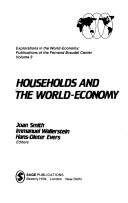Explorations in the World Economy
2 total works
Households and the World-Economy
by Joan K. Smith, Immanuel Wallerstein, and Hans-Dieter Evers
Published 28 December 1984
In most large scale analyses of the world-economy, the basic building blocks of economies -- households -- are forgotten. This volume is a reminder to researchers of the crucial link between individual household behaviour, the state, and the world-economy. A group of distinguished American and European scholars have brought their work together in this book to present the first world-systems analysis of the household. Drawing together literature from fields as diverse as macro-economic processes and women′s and family studies, this book links the structure of the world labour force to the functioning of the world-economy.
A major breakthrough. Not only is this volume a collaboration between Soviet and American scholars, it is a first attempt at empirical verification of abstract concepts of labour that have been in use for some time. The essays focus on three key themes: the differences in the role of workers in core and peripheral countries; the relationship between nationalism and working class movements; and the increasing qualification of workers and the ′deskilling′ of work. Fascinating differences in approach and conclusions between American and Soviet researchers are revealed.

